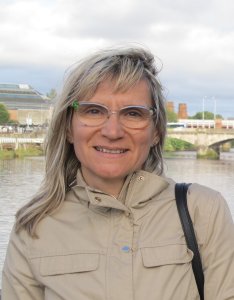Presented By: Department of Linguistics
Linguistics Colloquium
Pilar Prieto, Universitat Pompeu Fabra

Pilar Prieto is an ICREA Research Professor at the Department of Translation and Language Sciences at Universitat Pompeu Fabra, Barcelona, Catalunya. Her research focuses on the communicative role of prosody and gesture in language, as well as their significance in language development and second language learning. She serves as associate editor of the journals Language and Speech and Frontiers in Communication. She is currently coediting a special issue of Language and Cognition on Multimodal Prosody and organizing the 1st International Multimodal Communication Symposium MMSYM, April 27-28 2023, Barcelona.
This event is hybrid, join us via Zoom or in East Hall 4448
TITLE
How the prosody in our hands and body can help us enhance second language pronunciation learning
Pilar Prieto (ICREA-Universitat Pompeu Fabra)
ABSTRACT
When we speak, we frequently use rhythmic hand gestures which are coordinated with prosodically prominent parts of speech (e.g., beat gestures). As most of the research on the benefits of gesture in the second language classroom has focused on the effects of representational gestures (e.g., for the acquisition of vocabulary), little is known about the potential beneficial effects of beats and other embodied prosodic movements on the learning of L2 pronunciation. In this talk I will discuss the results of several experiments carried out in our research group that deal with how beat gestures and other embodied rhythmic and melodic movements facilitate the learning of second language pronunciation. Experiments 1 and 2 will assess the potential benefits of observing and performing beat gestures on L2 pronunciation learning by intermediate Catalan learners of English. Experiments 3 and 4 will analyze the benefits of performing hand-clapping on L2 pronunciation learning at initial stages of L2 acquisition of French by Catalan and Chinese native speakers. Experiments 5 and 6 will assess the effects of the use of melodic and rhythmic hand movements on the learning of both suprasegmental and segmental information by English and French language learners. Widening the scope of this investigation, Experiment 7 will assess the boosting effects of an embodied music-based rhythmic and melodic training which does not involve speech in the foreign language for English pronunciation learning. Based on the positive findings from these experiments, I will discuss the results of a recent study testing the idea that embodied narrative-based natural classroom interventions have the potential to be used as strong scaffolding mechanisms for speech production. I will finally suggest that a more active, context-based multimodal approach to teaching pronunciation could be successfully applied to both language teaching and speech treatment contexts.
This event is hybrid, join us via Zoom or in East Hall 4448
TITLE
How the prosody in our hands and body can help us enhance second language pronunciation learning
Pilar Prieto (ICREA-Universitat Pompeu Fabra)
ABSTRACT
When we speak, we frequently use rhythmic hand gestures which are coordinated with prosodically prominent parts of speech (e.g., beat gestures). As most of the research on the benefits of gesture in the second language classroom has focused on the effects of representational gestures (e.g., for the acquisition of vocabulary), little is known about the potential beneficial effects of beats and other embodied prosodic movements on the learning of L2 pronunciation. In this talk I will discuss the results of several experiments carried out in our research group that deal with how beat gestures and other embodied rhythmic and melodic movements facilitate the learning of second language pronunciation. Experiments 1 and 2 will assess the potential benefits of observing and performing beat gestures on L2 pronunciation learning by intermediate Catalan learners of English. Experiments 3 and 4 will analyze the benefits of performing hand-clapping on L2 pronunciation learning at initial stages of L2 acquisition of French by Catalan and Chinese native speakers. Experiments 5 and 6 will assess the effects of the use of melodic and rhythmic hand movements on the learning of both suprasegmental and segmental information by English and French language learners. Widening the scope of this investigation, Experiment 7 will assess the boosting effects of an embodied music-based rhythmic and melodic training which does not involve speech in the foreign language for English pronunciation learning. Based on the positive findings from these experiments, I will discuss the results of a recent study testing the idea that embodied narrative-based natural classroom interventions have the potential to be used as strong scaffolding mechanisms for speech production. I will finally suggest that a more active, context-based multimodal approach to teaching pronunciation could be successfully applied to both language teaching and speech treatment contexts.